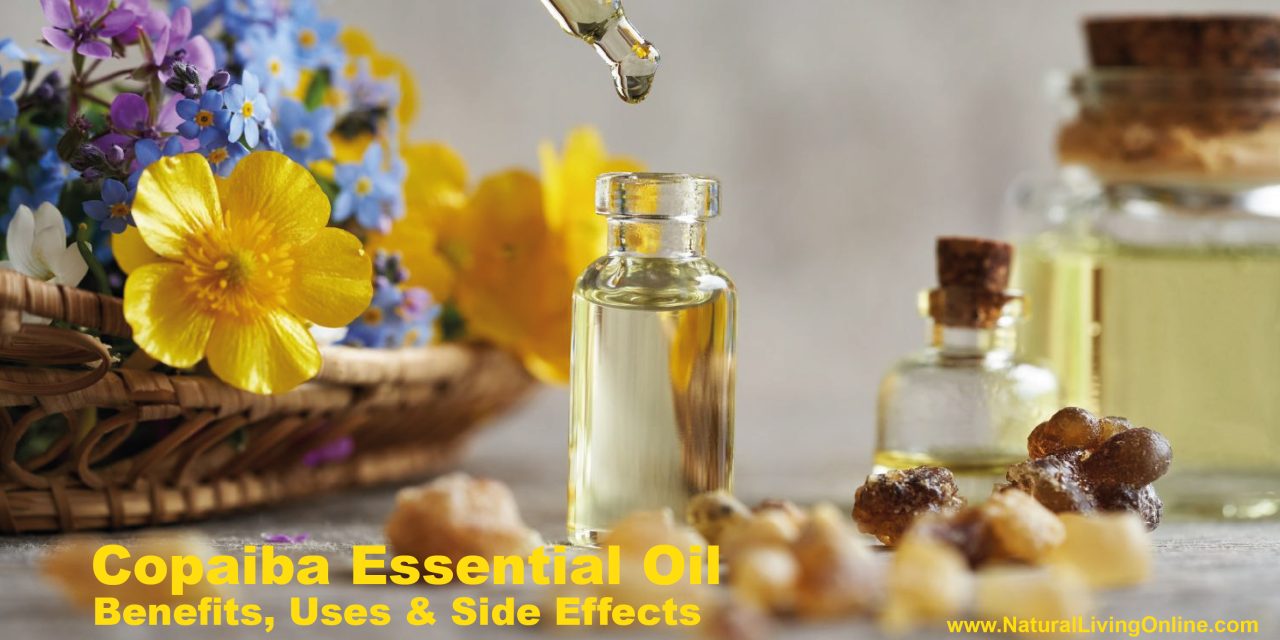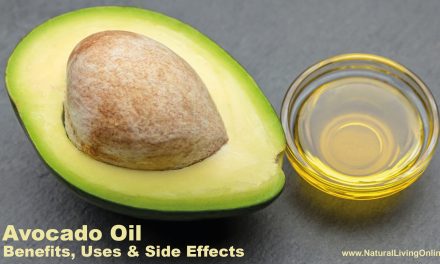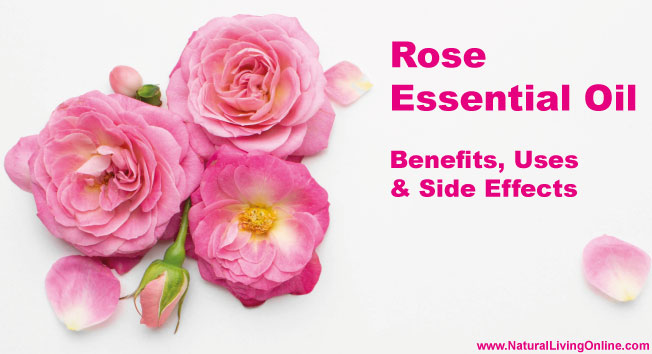Copaiba essential oil, derived from the resin of the copaiba tree, is known for its numerous health benefits. This essential oil has been used in medicinal practices for centuries, particularly by those living in regions where the copaiba tree grows. Copaiba essential oil is praised for its anti-inflammatory, anti-bacterial, and pain-relief properties that can be beneficial for various health issues.
In aromatherapy, copaiba oil is valued for its ability to reduce stress and anxiety. When used topically, it can alleviate muscle pain, rheumatism, and skin conditions such as acne and fungal infections. It is essential to remember that while copaiba oil has many benefits, it must be used correctly to avoid potential side effects like stomach pains or skin irritation.
Whether you are looking to use copaiba essential oil for its healing properties or simply want to learn more about its uses and potential side effects, understanding how and when to use it can help you make the most of its powerful benefits.
Key Takeaways
- Copaiba essential oil has anti-inflammatory and antibacterial properties.
- It can be used in aromatherapy and topical applications for various health benefits.
- Proper use is crucial to avoid side effects.
Origins and Composition

Copaiba essential oil originates from the resin of the Copaiba tree. This tree is primarily found in the Amazon rainforest. The oil contains several important compounds, including beta-caryophyllene.
South American Roots
The Copaiba tree, scientifically known as Copaifera officinalis or Copaifera langsdorffii, predominantly grows in South America, especially in the Amazon rainforest. These trees can reach impressive heights, often towering up to 90 feet.
The resin is harvested from these trees by making small cuts in the trunk. This process doesn’t harm the tree, allowing it to continue growing and producing resin.
The resin contains beta-caryophyllene, a compound known for its potential anti-inflammatory effects. Beta-caryophyllene has attracted significant attention for its medicinal properties.
The rich composition of Copaiba oil makes it valuable for various uses. Its complex makeup includes sesquiterpenes, which enhance its therapeutic benefits.
Copaiba Essential Oil Profile
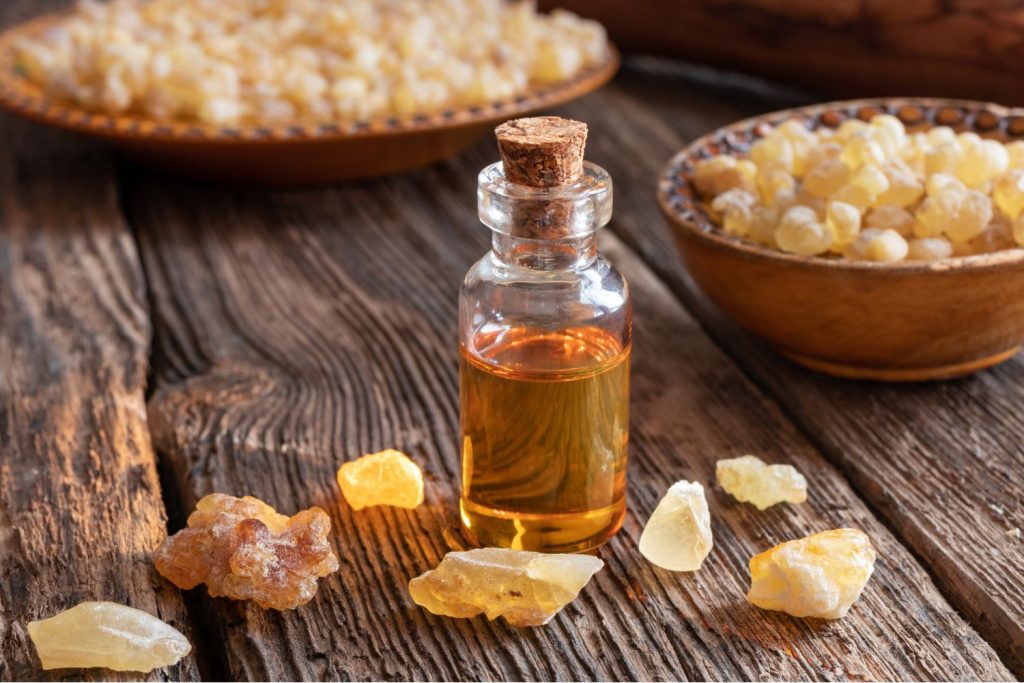
Botanical Name: Copaifera officinalis, Copaifera langsdorffii, or other Copaifera species
Family: Fabaceae
Common Names: Copaiba oil, Copaiba balsam, Copaiba resin oil
Plant Description
Copaiba trees are native to South America, particularly the Amazon rainforest. These large, tropical trees can grow up to 30 meters (98 feet) tall. The resin is tapped from the trunk of the tree, much like maple syrup, and has been traditionally used for its medicinal properties by indigenous communities.
Oil Description
Copaiba essential oil is derived from the resin of the copaiba tree. It has a light, woody, and slightly sweet aroma with earthy undertones. Its gentle fragrance makes it a versatile choice for blending with other essential oils.
Extraction Method
Steam distillation of the resin (oleoresin) tapped from the trunk of the copaiba tree.
Primary Chemical Components
- Beta-Caryophyllene (45-55%): A sesquiterpene with anti-inflammatory and analgesic properties.
- Alpha-Humulene: Supports skin health and reduces inflammation.
- Delta-Cadinene: Contributes to antimicrobial activity.
- Sesquiterpenes and Diterpenes: Provide calming and grounding effects.
Properties
- Anti-inflammatory: Reduces inflammation in the body and skin.
- Analgesic: Relieves pain and discomfort.
- Antimicrobial: Helps fight bacteria, fungi, and other pathogens.
- Antioxidant: Protects cells from oxidative stress.
- Wound Healing: Supports the skin’s natural healing process.
- Respiratory Support: Soothes respiratory issues.
- Calming: Promotes relaxation and emotional balance.
Uses
- Skincare:
- Acne Treatment: Reduces redness, swelling, and irritation associated with breakouts.
- Wound Healing: Speeds up the healing process of minor cuts and scrapes.
- Anti-Aging: Protects against oxidative stress and supports skin elasticity.
- Soothing Irritation: Alleviates redness and inflammation from skin conditions like eczema or psoriasis.
- Pain Management:
- Muscle Relief: Used in massage blends to ease muscle tension and soreness.
- Joint Health: Reduces discomfort associated with arthritis or other joint conditions.
- Respiratory Support:
- Cough and Congestion: Added to diffusers or steam inhalation for respiratory relief.
- Aromatherapy:
- Stress Reduction: Promotes relaxation and emotional grounding.
- Sleep Aid: Used in nighttime blends to improve sleep quality.
- Oral Health:
- Gum Health: Incorporated into mouth rinses for its antimicrobial and soothing effects.
- Household Uses:
- Natural Cleaner: Added to homemade cleaning products for its antimicrobial properties.
- Deodorizer: Used in diffusers to freshen indoor spaces.
Blends Well With
Eucalyptus
Lavender
Frankincense
Cedarwood
Bergamot
Peppermint
Rosemary
Health Benefits

Copaiba essential oil is known for its wide range of health benefits, including its anti-inflammatory properties, benefits for skin care, use in aromatherapy, and its antimicrobial benefits that support the immune system.
Anti-Inflammatory and Pain Relief
Copaiba oil contains beta-caryophyllene, which has significant anti-inflammatory and pain-relieving abilities.
It is particularly effective in reducing joint pain and symptoms of arthritis. People with chronic pain conditions can apply it topically, often mixed with a carrier oil, to soothe sore muscles.
Copaiba oil is also beneficial for those with lupus and gout. Its anti-inflammatory properties make it a natural option for managing pain without relying on synthetic medications.
Research supports these effects, making copaiba oil a valuable addition to an anti-inflammatory regimen.
Skin Care Applications
Copaiba essential oil is popular for treating various skin conditions.
It helps clear acne by reducing inflammation and preventing infection. The oil’s antiseptic properties support faster healing of wounds and cuts.
When applied to the skin, it provides moisture, which is beneficial for dry or irritated skin.
Using copaiba oil in a diluted form can improve skin tone and reduce the appearance of scars.
These benefits make it a versatile addition to skincare routines, especially for those with sensitive or problematic skin.
Aromatherapy and Mental Health
In aromatherapy, copaiba oil is used to alleviate anxiety and stress.
Its pleasant, woodsy aroma helps calm the central nervous system, contributing to improved mental health.
Inhaling copaiba oil, either through a diffuser or directly, can promote emotional well-being and relaxation.
This makes it a useful tool for managing anxiety and other stress-related conditions. People looking for natural ways to improve their mood might find copaiba oil particularly helpful.
These effects contribute to its popularity in aromatherapy.
Antimicrobial and Immune Support
Copaiba oil has antimicrobial properties that can enhance the immune system.
It is effective in reducing the growth of fungi and bacteria, which makes it useful for preventing infections.
Using copaiba oil can support the body’s natural healing processes and promote overall health by bolstering immune defenses.
Its ability to fight off harmful microorganisms makes it a potential ally in maintaining good health and preventing illness.
These antimicrobial benefits are significant for anyone looking to strengthen their immune system naturally.
Application Methods
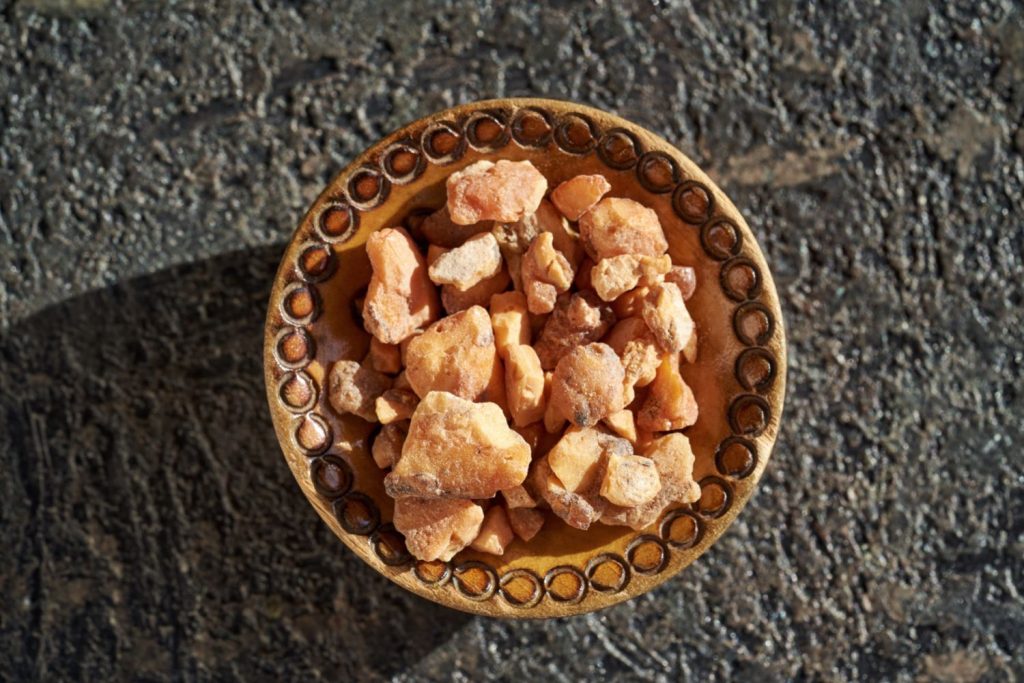
Copaiba essential oil can be applied in various ways, such as topically or through aromatic diffusion. It must be used with care to avoid any adverse effects.
Topical Applications
When using copaiba essential oil on the skin, it’s crucial to always dilute it with a carrier oil. Good options include almond oil, coconut oil, or jojoba oil. This helps prevent skin irritation which can occur if the essential oil is too concentrated.
Apply the diluted mixture directly on areas of discomfort or inflammation. For example, it can be massaged onto sore muscles or swollen joints to reduce pain and swelling. Avoid using it on broken skin or open wounds. A typical dilution ratio is 2-3 drops of copaiba oil to a teaspoon of carrier oil.
Aromatic Diffusion
Using a diffuser is an effective way to enjoy the benefits of copaiba oil through inhalation. Diffusing copaiba oil can promote relaxation, relieve stress, and improve mood. Add a few drops of copaiba oil to the diffuser with water as instructed by the diffuser manufacturer.
Running the diffuser for 15-30 minutes at a time is usually sufficient. This method also helps purify the air and can be used in spaces like bedrooms or offices. Ensure that the room is well-ventilated and monitor for any respiratory discomfort.
Internal Use Precautions
Caution is essential when considering internal use of copaiba essential oil. Consult a healthcare professional before ingesting, as it can have potent effects and may not be safe for everyone. Pregnant women, children, or individuals with specific health conditions should avoid internal use unless directed by a doctor.
If approved for internal use, it must be heavily diluted and taken in very small amounts. One common method is to mix a drop of copaiba oil in a glass of water or a teaspoon of honey. Ensuring proper guidance and careful dosages can help mitigate potential side effects.
Frequently Asked Questions
How can Copaiba oil be used to alleviate different types of pain?
Copaiba oil is known for its anti-inflammatory properties. It can be used to help with muscle pain, rheumatism, lupus, and gout. Diluting the oil with a base oil and massaging it into affected areas can be especially effective.
What are the potential benefits of Copaiba oil for managing anxiety?
Inhaling Copaiba oil can help reduce feelings of anxiety and stress. Diffusing the oil or inhaling it directly are common methods to use for emotional well-being.
In what ways can Copaiba essential oil benefit skin health?
Copaiba oil has properties that promote wound healing and reduces inflammation. It can be beneficial in treating skin conditions by applying it topically after diluting with a carrier oil.
What are the spiritual benefits associated with the use of Copaiba essential oil?
Copaiba oil is often used in spiritual practices to promote emotional grounding and clarity. Some believe it helps enhance meditation and connection to inner peace.
What should be considered when using Copaiba oil with a diffuser?
When using a diffuser, it’s important to use the correct amount of Copaiba oil to avoid overpowering the scent. Proper ventilation in the room will help prevent any potential irritation from inhaling the oil.
Are there any known side effects associated with the use of Copaiba oil?
Copaiba oil is generally considered safe, but some people may experience allergic reactions or skin sensitivity. Make sure to do a patch test before using it extensively and consult a healthcare professional if you experience any adverse reactions.
References:
This website does not provide medical advice.
All information provided on this website, and on associated social media networks, including but not limited to texts, images, and numbers are for general information purpose only. It is not intended as medical advice and it does not include all possible precautions, side effects, or interactions that may occur. Neither NaturalLivingOnline.com nor its author/founder take responsibility for how you use this information. Statements contained on NaturalLivingOnline.com have not been evaluated by the FDA. You should conduct thorough research via multiple sources and consult your physician or qualified doctor before using any essential oil or herbal remedy. Information on NaturalLivingOnline.com must not be relied upon for medical, legal, financial or other decisions.

